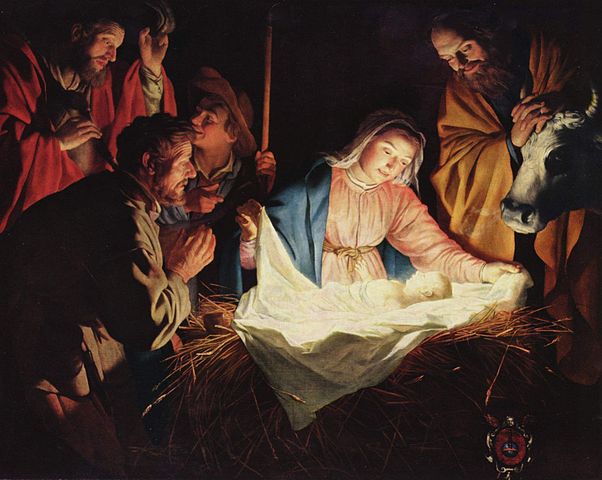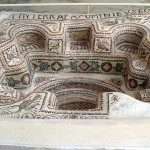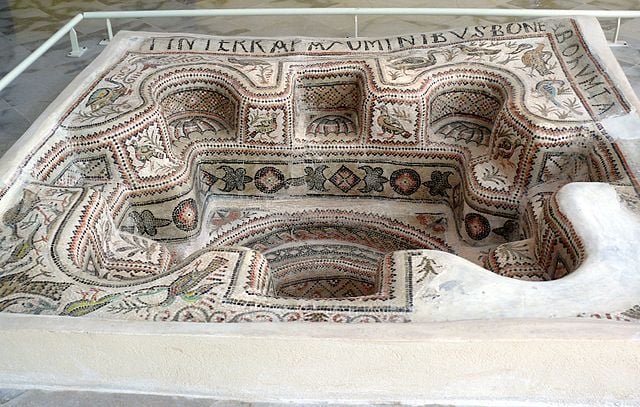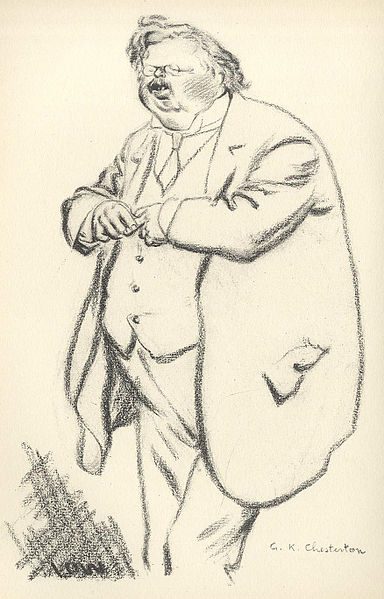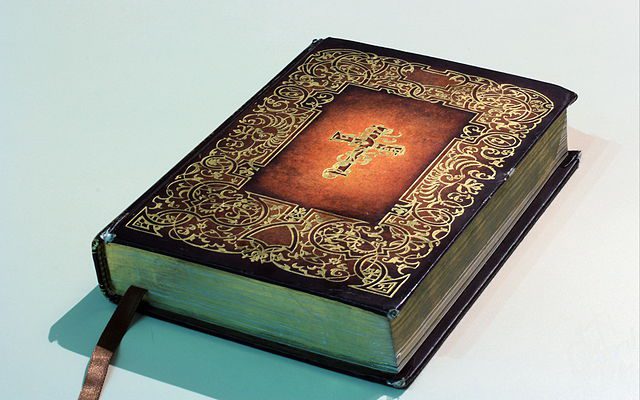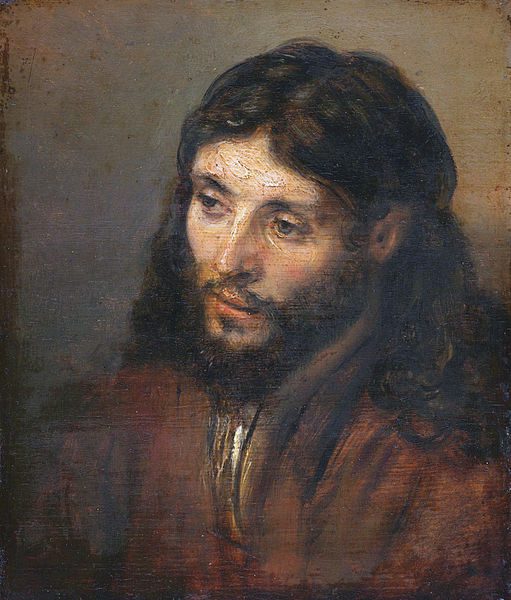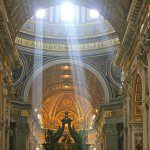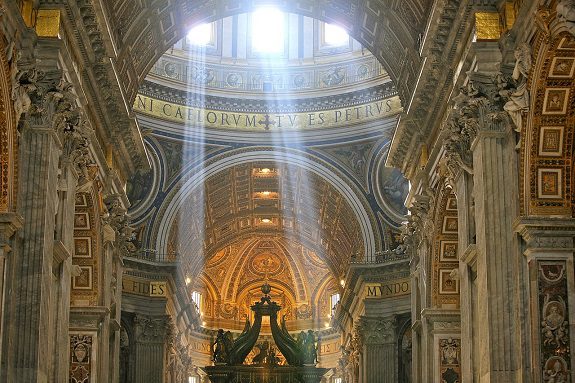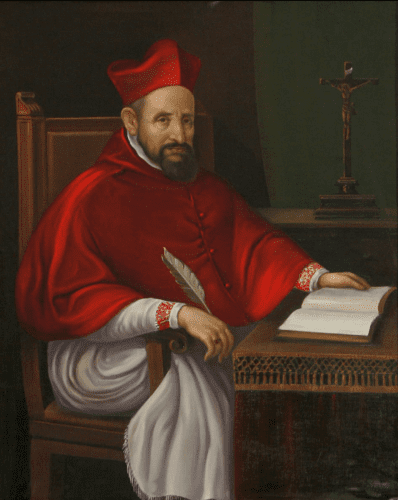Reply to Atheist John W. Loftus’ Irrational Criticisms of the Biblical Accounts
(2-3-11)
Atheist and former Christian John W. Loftus runs the Debunking Christianity website. I hung around there quite a bit a few years ago. Many attempted interactions with him and his positions can be found on my Atheism, Agnosticism, and Secularism web page.
In recent months I have been particularly interested in submitting refutations of claims that the Bible is internally contradictory. Loftus’ post, “Was Jesus Born in Bethlehem?” (originally 12-16-06 and charmingly re-posted on Christmas Eve, 2010) offers one such golden opportunity. His words will be in blue.
* * * * *
Consider the other problems inherent with the story:
Jesus was not born in Bethlehem, if Luke is taken literally, according to E. P. Sanders [The Historical Figure of Jesus (Penguin Press, 1993, pp. 84-91)].
Right. Let me see if I understand this correctly: the text in Luke (2:4, 15) states that He was born there, but somehow, if we take the account “literally,” He actually wasn’t, according to the Wise Men of our time. I wonder, then: if a text makes an assertion, but the very assertion supposedly proves the thing is false, then how do we know when something is true? The text has to deliberately not assert it; then we know it is true? That makes a lot of sense, doesn’t it? About as much sense as a hole in the head . . .
Loftus, following Sanders’ eisegetical methodology, arbitrarily charges interpolation or text alteration when he finds anything in the Bible difficult to reconcile with anything else. This is the game that Bible skeptics have been playing for two thousand years now. Hence, Sanders writes in his book (music to Loftus’ atheist ears):
The two gospels [Matthew and Luke] have completely different and irreconcilable ways of moving Jesus and his family from one place to the other . . . It is not possible for both these stories to be accurate. It is improbable that either is. . . .
People resort to such alterations of the text in order to save it: the text must be true, and if we revise it we can still claim that it is true. Revision, however, overthrows the principle.
(pp. 85-86; hardcover edition available at amazon)
This is classic “higher critical” mentality (going back in this case to famous “higher critics” David Strauss [in an 1839 work] and Ernest Renan [1863]): if there is any “problem” in interpreting the biblical text, then immediately we resort to cynical and ungrounded speculation about unsavory motivations of the writers and their desire to modify texts regardless of the actual facts of any given matter. This, of course, cannot be proved. It’s all sheer speculation. It all has to do with how one approaches the issue from the outset: with openness and at least attempted objectivity, or with hostility and a sort of paternalistic cynicism. Loftus openly admits in the combox (12-23-06) that his hostile presuppositions and premises determine virtually everything:
I state how I see things. That’s all I can do. For me it’s all about seeing things differently. It’s not about more and more knowledge. It’s about viewing what we know in a different light. . . . For me it’s not about more and more knowledge. It never has been. It’s about seeing the knowledge we already have in a different light. So I shed light on how I see things. That’s all I can do. You’ll either see it, or you won’t. . . . No one sees things differently in bits and pieces. It’s an all or nothing happening. But before you can see the whole, I must share how I see things on a wide variety of the bits and pieces. So just add this bit and piece to the other bits and pieces I’ve shared here (that make no sense to you whatsoever), but at some point, if I keep on doing this, and if it’ll happen at all, you will catch a glimpse of how I see the total set of things. I don’t know what you know, and you don’t know what I know. But how we view that which we know is the difference that makes all the difference.
It’s all in the interpretation and the premises one has, and these can suddenly change. As Loftus correctly puts it: “It’s an all or nothing happening.” I’ve been arguing this for years, myself, so it is gratifying to see an atheist so eloquently verify my critique (and theory) of how atheism somehow comes about in a Christian mind.
What husband would take a nine-month pregnant woman on such a trek from Nazareth at that time when only heads of households were obligated to register for a census when the census would’ve been stretched out over a period of weeks or even months?
Obviously, there must have been some necessity or compulsion for Mary to also be present. But that makes no sense to Loftus: he would rather impugn the character of the Gospel writers, by having them drum up an account with a nearly-due pregnant wife subject to grueling discomforts, that he, in his infinite atheist wisdom, can immediately figure out is implausible. Thus, recourse to desperate fictional accounts seems far more likely to Loftus than the first scenario.
Luke 2:3 refers to Joseph being “enrolled with Mary, his betrothed.” Perhaps the impending marriage was an additional factor requiring her to also be there. The New Bible Dictionary (1962 ed., “Census,” p. 203) observed:
It is . . . widely agreed . . . that it could have involved the return of each householder to his domicile of origin, as Lk. ii. 3 states.
But if he did, why did he not take better precautions for the birth? Why not take Mary to her relative Elizabeth’s home just a few miles away from Bethlehem for the birth of her baby?
Probably because the baby chose to arrive at the time He did, when they were going to register for the census! I guess Loftus isn’t familiar with the process of childbirth. I’ve witnessed all four of my children being born. One time we made an entire trip some 12 miles away to the hospital, only to be turned away, as it was too early. There is no need to be cynical about this aspect of the story. Babies are born when the “time is right,” and often we have no idea when that will be.
According to Luke’s own genealogy (3:23-38) David had lived 42 generations earlier. Why should everyone have had to register for a census in the town of one of his ancestors forty-two generations earlier? There would be millions of ancestors by that time, and the whole empire would have been uprooted. Why 42 generations and not 35, or 16? If it was just required of the lineage of King David to register for the census, what was Augustus thinking when he ordered it? He had a King, Herod. “Under no circumstances could the reason for Joseph’s journey be, as Luke says, that he was ‘of the house and lineage of David,’ because that was of no interest to the Romans in this context.” [Uta Ranke-Heinemann, Putting Away Childish Things, (p.10)].
Lineage and past history were very important to Jews. Being from the lineage of David was obviously a point of pride for a Jew. Distance in time was as irrelevant then as it is to Jews even now (even atheist Jews: I’ve talked to at least one), who celebrate Passover: commemorating an event that is now well over 3000 years ago. Hannukah celebrates an event that happened in approximately 165 B.C.: over 2000 years ago.
The time from David to Mary and Joseph was a mere 1000 or so years. I fail to see the validity of this lightweight objection. It was probably determined, anyway, by whatever the Roman law entailed: registration in ancestral lands. It may have been a matter of voluntary Jewish (or local Roman) custom, or a sort of combination of both things. Hence, the liberal Catholic scholar Raymond Brown suggested:
One cannot rule out the possibility that, since Romans often adapted their administration to local circumstances, a census conducted in Judea would respect the strong attachment of Jewish tribal and ancestral relationships.
(The Birth of the Messiah: New York: Doubleday, 549)
According to Jewish census customs (assuming for the sake of argument, that Roman Palestine took them into account), ancestral home was highly important, and both the husband and wife would travel: especially in this instance, since Mary was also of the lineage of David).
Conservapedia: “Luke and the Census” offers similar plausible scenarios:
A final set of objections has nothing to do with the date of the census, or the translation of the passage in question, but instead aims to launch a flurry of speculative attacks at the details provided by Luke. Perhaps the most common is the objection that a census would not have required travel. Adding to the difficulty is a misunderstanding of Luke’s text, whereby it is believed that Saint Luke is describing a decree that required the taxed to return to their ancestral townships.
This formed the backbone of the set of criticisms leveled by E. P. Sanders, who stated that it would have been the practice for the census-takers, not the taxed, to travel. Moreover, he added that such a decree would require people to keep track of millions of ancestors; tens of thousands of descendants of David would all be arriving at Bethlehem, his birthplace, at the same time; and Herod, whose dynasty was unrelated to the Davidic line, would hardly have wished to call attention to royal ancestry that had a greater claim to legitimacy.
[Footnote 28: E. P. Sanders, The Historical Figure of Jesus, Penguin, 1993, p86; see also Bart Ehrman, A Brief Introduction to the New Testament, p 103.]
The simple fact is that Luke does not, in any place, state that the census required people to travel to the home of their ancestors. Instead, Luke says simply that “all went to their own towns”. When Luke mentions return to one’s ancestral town, he is speaking only of Joseph.
[Footnote 29: Mark D. Smith ‘Of Jesus and Quirinius’, in Catholic Biblical Quarterly, vol. 62, no. 2 (April 2000), p. 289.]
In other words, people were required to travel to their township, but only this. Joseph chose to journey to his ancestral town, and to be registered there, rather than to his town of residence.
Mark D. Smith gave two reasons why Joseph would have made such a choice. As historian S. L. Wallace and others observed, some censuses gave up to a 50% tax reduction if one registered in a metropolis.
[Footnote 30: S. L. Wallace, Taxation in Egypt from Augustus to Diocletian (Princeton University Studies in Papyrology 2; Princeton University Press, 1938); cf. N. Lewis, Life in Egypt Under Roman Rule (Oxford: Clarendon, 1983), p. 170; Derrett, Further Light on the Nativity of the Nativity p. 90-94.]
Because Bethlehem, Joseph’s ancestral home, was close to Jerusalem, he could qualify for the reduction.
[Footnote 31: Smith, ibid., p. 297]
This incidentally answers another objection; namely, why Joseph would have brought the very pregnant Mary along – he could have been motivated to register his firstborn son so that Jesus would qualify for the reduction when he came of age.
[Footnote 32: Smith, ibid., p. 297]
Census records from Egypt record an unusual number of houses listed as having no resident, and this may be evidence for the practice of registering in a metropolis (if one could make such a claim) rather than a town of residence.
[Footnote 33: Brook W. R. Pearson, ‘The Lukan Census, Revisited’, in Catholic Biblical Quarterly, vol. 1, no. 2 (April 1999), p. 276.]
The second reason given by Smith is that Joseph may have owned property in his ancestral home, Bethlehem, and thus would need to register there. This property could have been as simple as farmland or a threshing floor, and need not imply any sort of wealth on Joseph’s part.
[Footnote 34: Smith, ibid., 289-90]
Against this, it has been argued that Joseph and Mary would not have needed to stay in an “inn”, as Luke records, if they had property in Bethlehem. The obvious weakness of this argument is that the property need not have constituted a suitable dwelling place, or a structure at all.
Radically questioning the text and/or the historicity of what is recorded there (leading to the foregone conclusion of questioning Jesus’ birth in Bethlehem) is obviously, then, not the only explanation any thinking person can give. But Loftus presents it that way; precisely because his skeptical game has no concern whatever for Christian explanations of the “difficulties” that atheists and other Bible skeptics love (almost more than anything) to toss abouit and chuckle over.
Loftus himself inadvertently concurs with one theory presented above (Joseph owning something in Bethlehem):
The fact is, even if there was a worldwide Roman census that included Galilee at this specific time, there is evidence that Census takers taxed people based upon the land they owned, so they traveled to where people lived.
If in fact Joseph owned some land in Bethlehem, then that was a different location from his current residence. Therefore, rather than making a censor travel to two places for one person, it stands to reason that the person with multiple properties would travel to at least one of them, especially if property directly tied into the census, as explained above (just like today: I use a business expense of home deduction, which ties property into income tax).
According to Robin Lane Fox, “Luke’s story is historically impossible and internally incoherent.”
That’s sheer nonsense. There is no impossibility in it at all. That is an extraordinarily silly claim for anyone to make: to try to assert a negative proposition like that.
But he says, “Luke’s errors and contradictions are easily explained.
That presupposes that they are there in the first place (which skeptics always do, rather than make any serious attempt to explain ostensible “difficulties”).
Early Christian tradition did not remember, or perhaps ever know, exactly where and when Jesus had been born. People were much more interested in his death and consequences.” “After the crucifixion and the belief in the resurrection, people wondered all the more deeply about Jesus’ birthplace. Bethlehem, home of King David, was a natural choice for the new messiah. There was even a prophecy in support of the claim which the ‘little town’ has maintained so profitably to this day.” So, “a higher truth was served by an impossible fiction.” [The Unauthorized Version: Truth and Fiction in the Bible(Knopf, 1992), p. 31-32]. “Luke’s real source for the view that Jesus was born in Bethlehem was almost certainly the conviction that Jesus fulfilled a hope that someday a descendant of David would arise to save Israel,” because the Messiah was supposed to come from there (Micah 5:2). [E. P. Sanders, The Historical Figure of Jesus (p. 87.)].
How quaint and (un)imaginative. Note what has happened here. This is the very essence of irrational special pleading. The text came about because of wishful thinking and the desire of the writers to cynically, deceitfully align with Old Testament messianic prophecy. But how does one possibly prove such an outlandish accusation? There is no hard evidence (let alone indisputable, ironclad) for such a thing! Our choice is to believe that:
1) The NT writers believed Jesus was born in Bethlehem because in fact He was born there, and they had evidence to substantiate the fact.
2) The NT writers knew that Jesus was not born in Bethlehem because they had no evidence to substantiate the fact, but they “wrote it in” anyway because of the need for Jesus as Messiah to fulfill OT prophecy that named the town (Micah 5:2).
3) The NT writers mistakenly but sincerely believed Jesus was born in Bethlehem and reported this as fact, even though they had no hard proof of it.
Now, how would one go about proving the second or third scenarios? If in fact the NT writers were lying through their teeth and didn’t believe their own words, how in the world would one establish that? If indeed Jesus was born in Bethlehem, as a point of actual fact (thinking purely theoretically for a moment), and if indeed the NT writers knew He was born there, and reported it, then there would be no deception, and this would in fact be a fulfillment of OT prophecy (i.e., for the person who believes in faith that Jesus is the Messiah, based on many considerations).
It all comes down to what is deemed to be fact and non-factual or of dubious historicity (from the historiographical perspective). But we can’t simply pull skeptical ideas out of a hat and assert them as if there is good reason to state such scenarios of alleged deliberate lying.
I can just as well fault skeptics who argue in such a way (that I think is circular special pleading) because they don’t believe in prophecy in the first place. Loftus obviously does not and cannot, since there is no God to give the revelation that is prophecy. If the thing is impossible, then obviously an alleged “fulfillment” of it is a sham as well.
So (given that hostile premise) it is thought that the Gospel writers were simply playing games by naming Bethlehem because of Micah 5:2: wholly apart from real knowledge of the event. But all they had to do was ask Jesus about it, or His parents. They were there. They knew what happened. They can’t change or manufacture their own lineage, which is why they were in Bethlehem in the first place. Even Jesus can’t change the fact of who His earthly parents were, as a point of fact.
It gets rather silly. As an analogy, to illustrate the foolishness of such “argumentation,” take the famous case (for baseball fans) of Babe Ruth calling his home run in the 1932 World Series. The fact is that he hit a home run in that game, and eyewitnesses swear to the fact that he “called the shot.” Now, let’s go ahead 2000 years from now and imagine how a skeptic would “reason”. The choices are again as follows:
1) The sportswriters believed Babe Ruth called and then hit the home run because in fact he did do both, and they had eyewitness evidence to substantiate the fact.
2) The sportswriters knew that Babe Ruth didn’t call and then hit the home run because they knew it didn’t actually happen, but they “wrote it in” anyway because of the need to create the myth of Babe Ruth as the greatest baseball player ever: larger than life.
3) The sportswriters mistakenly but sincerely believed that Babe Ruth called and then hit the home run and reported this as fact, even though they had no hard proof of it.
Now, would someone 2000 years later be acting reasonably in believing #1? Yes. Could they reasonably take position #2? Yes, provided they produced some documented evidence for the assertion. They could also believe #3, but would need evidence for that, too. But the problem is that biblical critics don’t require (let alone use or produce) any hard evidence to start questioning anything in the Bible. With their mentality, they could simply deny that Babe Ruth called the home run. Or they could deny that he actually hit it. Why believe 50,000 spectators in the park and the box scores? They could all have been made up for the purpose of myth-making. If 500 eyewitnesses in the Bible can make up a Resurrection appearance, why can’t 50,000 make up a legend of Ruth predicting his homer?
So that is how they would reason, if they were subject to the irrationalism of Loftus and a pitiable multitude biblical skeptics who think, clone-like, just like him. But the fact remains that the home run was hit, and that (by most accounts) it was called. That is the fact. And Jesus’ birth in Bethlehem can just as easily and conceivably also be a fact. He had to be born somewhere. Why should the Bible lie about it? To fulfill prophecy, so we are told, but that reasoning is ultimately circular: merely assuming without argument or evidence what it needs to prove.
In many other places we read that the people of his time called him “Jesus of Nazareth” (Matthew 26:70-72; Mark 1:23-25; Mark 10:46-48; Luke 4:34; Luke 18:37; Luke 24:20; John 1:45; John 18:6-8; John 19:19; Acts 2:22; Acts 6:14; Acts 10:38; Acts 22:9; Acts 26:9), so scholars conclude it’s more likely that Jesus was born and raised in Nazareth. They think this because the NT writers quoted OT verses from Psalms and the prophets out of context to point to Jesus. The NT writers were intent on making Jesus’ birth, life, nature and mission to fit anything in the Old Testament that could be construed to speak of him, as proof he was who they claimed him to be.
This is delicious. I think it utterly backfires as an argument. Why and how it does is almost so obvious that one could miss it. We have just been told that it is intelligent to believe that the NT writers made up Jesus’ birth in Bethlehem because they were deliberately making it fulfill the prophecy of Micah 5:2, even though they knew it was untrue or didn’t know where Jesus was born. Hold that thought.
Now we are told that the title Jesus of Nazareth somehow suggests that Jesus was not born in Bethlehem because He was raised in Nazareth. That clearly doesn’t follow. My father lived in the Detroit area for over sixty years. But he was born in Canada: about sixteen miles over the border. One can easily be associated with a town without having been born there. So that in itself is a gratuitously false premise.
But the massive biblical use of Jesus of Nazareth actually works against Loftus’ argument, because if the writers of the New Testament “were intent on making Jesus’ birth, life, nature and mission to fit anything in the Old Testament that could be construed to speak of him,” why in the world would this title be featured, since the messianic prophecy about birth was about Bethlehem? The skeptic can’t have it both ways. If the writers were trying to lie and make out that Bethlehem was the place then why was it mentioned so few times, while Nazareth was mentioned many times? It makes no sense. The skeptical scenario doesn’t have the ring of truth.
The mention of Nazareth is taken at face value (so it is concluded that Jesus not only lived, but was born there), while the occurrences of “Bethlehem” are scorned simply because of the connection to Micah 5:2. Nazareth is not even mentioned in the Old Testament at all! So if they were trying to lie, this would be one of the last choices of location to use. Matthew 2:23 ties “Nazarene” to the prophets, but these prophecies were not in the Old Testament. They were either from an extrabiblical source or oral tradition. Therefore, if the goal was to find Old Testament references, “Nazareth” is an inscrutable choice, whereas Bethlehem was indisputably mentioned there and connected to the Messiah.
But any Christian today who uses the Bible to argue for their views without taking into consideration the context of the passages in question, would be laughed at even in their own academic circles!
Yes, and when atheists do this all day long and incessantly in their endless rants against the Bible, those of us who actually study and revere the Bible think very little of their efforts, too. But it’s very time-consuming to tediously show how they distort things. That’s why there are full-time apologists like myself, who can take the time to do the necessary work to show the fallacies and lay bare the cynical folly and irrationality of these efforts.
Matthew’s account of Jesus’ birth fares no better. Robin Lane Fox: “Bethlehem was not Jesus’ birthplace but was imported from Hebrew prophecies about the future Messiah; the Star had similar origins (Numbers 24:17). Matthew’s story is a construction from well-known messianic prophecies (Bethlehem; the Star), and the Wise Men (Magi) have been added as another legend.” “Where the truth had been lost, stories filled the gap, and the desire to know fabricated its own tradition.”
More circular reasoning and unsubstantiated nonsense, as explained above.
There are even discrepancies between the Gospels themselves:
“Luke told a tale of angels and shepherds, bringing some of the humblest people in society to Bethlehem with news of Jesus’ future. Instead of shepherds, Matthew brought Wise Men, following a star in the East and bringing gifts…In one version, there are simple shepherds, the other, learned Wise Men: the contrast sets our imaginations free, and perhaps like the Wise Men we too should return by ‘another way.” [The Unauthorized Version: Truth and Fiction in the Bible (Knopf, 1992), pp.35- 36].
How is this a “discrepancy”? One mentions one thing; the other mentions another. Neither says they were the only people there. So what? But the wise men actually came two years later, according to most Bible-believing scholarship (based on the evidence of Matthew 2:16), so it is talking about two different occasions anyway: all the more reason to deny the absurd charge of contradiction.
Luke has Joseph and Mary living in Nazareth from where they traveled to Bethlehem for the Roman census (Luke 1:26; 2:4). After Jesus was born, Joseph took his family from Bethlehem to Jerusalem for up to 40 days (Luke 2:22), and from there straight back to Nazareth (Luke 2:39). But Matthew says Jesus was born in a “house” where Joseph’s family lived in Bethlehem. And after the birth of Jesus they lived there for up to two years (Matt 2:16)! After the Magi leave them, Joseph is warned in a dream to flee to Egypt and stay there until Herod died (Matt. 2:15). After Herod died, Joseph was told in a dream to return to the land of Israel, and he headed for his home in Bethlehem of Judea. But since he was afraid to go there, he settled in Nazareth (Matt. 2:21-23), for the first time!
The fabulous Protestant apologist Glenn Miller, who specializes in debunking all of these endlessly alleged “Bible difficulties” took on these charges in his post, “Contradictions in the Infancy stories?” He observed:
First, let’s look at the statement of [atheist Christopher] Hitchens that Luke and Matthew “flatly contradict one another on the Flight to Egypt”. Now, to verify this claim it is necessary first to take the two statements by each author and look at them side by side. Then, we can look into more detail about the two statements to see if they are in fact ‘contradictory without a doubt’. [cites Matthew passage] . . .
Compare that with Luke’s statement about the Flight to Egypt:–oops, there is no statement by Luke on the Flight to Egypt. In fact, he doesn’t mention it one way or the other. He doesn’t support the historicity of the Flight, nor does he disparage it.
OK, that was easy. There cannot be statements that ‘flatly contradict’ (note the ‘-dict’ part of the word… means ‘something SAID’) one another on subject X if there is only one statement about X!
But we all know what the atheist-fellow means: the accounts flatly contradict one another if you make the silence in Luke (about the Magi/Flight) mean more than silence, and if you insert the word ‘immediately’ into the silence in Matthew about WHEN the warning to Joseph came… If ‘silence about event X’ means ‘denial of event X’ or ‘immediately’ (smile), then maybe they are correct. But this is a BIG, BIG step—from silence to denial (especially in historical accounts!)—and even if it is true, it is certainly not obvious, explicit, or a case of ‘flatly contradicting’. Silence can mean many things other than ‘denial’ (e.g., lack of interest, irrelevance to the argument–even ignorance of the fact itself is not ‘denial’!). To read ‘immediacy’ into a silence is just as bad.
But you should all see by now what I mean, too: in the absence of EXPLICIT contradiction, one has to interpret the text in such a way as to CREATE a contradiction. There is no contradiction in what the text ‘presents’–at a surface level–but one has to re-create the historical scene “behind” the text, in such a way as to GENERATE a contradiction. In other words, we take textual statements and ‘visualize’ or ‘re-create in our minds’, if you will, the historical sequence BEHIND those texts. Our author has taken the gospel narratives and ‘re-created’ the historical scene as one in which the sequences are out-of-synch. But the text itself does not make that explicit at all, and the same textual data can be used to ‘re-create’ in-synch sequences as well (at least two plausible ones, as we will note toward the end of this discussion).
[all emphases and capitals and coloring his own]
Miller summarizes the two accounts and draws conclusions from them (I added a few words — in brackets –, where he used abbreviations):
Note a couple of things from Luke:
Joseph and Mary are from Nazareth
(No mention of pregnancy-crisis)
They travel to Bethlehem
Jesus is born in Bethlehem
Shepherds visit Jesus in Bethlehem
Joseph/Mary/Jesus make a trip to Jerusalem for various Jewish rituals
(No mention of Magi/Flight)
Sometime after the various rituals, they return to their own city of Nazareth.
When we compare this list with Matthew, here’s what we see:
Joseph and Mary are introduced without reference to [Bethlehem] or [Nazareth].
Pregnancy-crisis.
Jesus is born in Bethlehem
(No mention of Shepherds)
(No mention of family trip to Jerusalem for obligatory Jewish rituals)
Visit of Magi
Flight to Egypt
Family settles in Nazareth
But notice that Luke does NOT indicate a short trip from Nazareth to Jerusalem (for ritual purposes) at all. Neither [Matthew] nor [Luke] have such a trip in their respective narrative, so the blog-visitor’s statement (at least the ‘specifically’ part) is inaccurate.
But also notice that both authors are only reporting some of the events—they share the key elements (i.e., Jesus born in royal city of Bethlehem, Jesus ends up in a despised town of Nazareth), and they each select a subset of the history for their particular point (e.g., Luke has the ritual-trip to emphasize the law-biding character of the family and the acceptance of Jesus by godly Jews; Matthew has the Flight/Secret-Return story to emphasize the early rejection of—or indifference to– Jesus by the Jewish leadership)
With the various omissions of each, it is hard to really construct ‘overlapping periods’ in which to situate anything but the barest of events. The centerpiece birth in Bethlehem anchors everything, and the story ‘ends’ at [Nazareth] in both. Thus, it would take more explicit textual data to make this into a problem…
What emerges from this first-glance look at the objections, is that much is being made from the omissions and silences in the text. To be sure, one COULD CHOOSE to interpret these silences/omissions in such a way as to construe these problems, but how would one defend such choices? Developing arguments from silence is notoriously dangerous, and rarely is certain enough to carry the conclusion single-handedly! . . .
Biographical writing is notoriously selective—hence the assumption of ‘full account’ will be wrong almost all the time (especially in antiquity). And whereas the birth-in-Bethlehem and the homesteading-in-Nazareth would fit the ‘so central… automatically included’ criteria, it would be not be obvious that ANY of the other details would be so central (e.g., the pregnancy-crisis, visits by Magi, flight to Egypt, slaughter of innocents, visits of shepherds, etc could easily be considered subservient to each author’s narrative purpose).
The article continues on in extreme detail, for anyone who is interested in delving into this textual issue in the utmost depth: examined in this case by someone who believes in biblical inspiration and the integrity of the biblical text — which is also a bias and premise, but far more acceptable in doing biblical interpretation than the constant hostility of the atheist or other kind of biblical skeptics.
He examines, in turn, arguments from silence, several Bible commentaries and their takes, “the conventional and/or preferred ways of delivering historical narrative” in the literary methods of the ancient world (a factor vastly unknown or ignored by atheist and theologically liberal “exegesis”), — particularly the techniques of “telescoping” and “thematic order,” which was “fairly standard practice in the ancient world.” He then provides hard evidence of these practices from:
1) a monument of ancient Assyria,
2) Josephus,
3) Thucydides,
4) Dionysius of Halicarnassus, and
5) Jason of Cyrene and the Roman Jurists.
Then he discusses “Epitome” — which “was a genre of writing which was specifically a condensation of another’s work(s), or a group of authors’ works on a specific theme.” He notes the ancient preference for thematic rather than chronological order and shows how the Bible writers were of the same mind in that respect. Miller writes (his bolding and color):
What this means is that it will be very, very difficult to find a ‘chronological contradiction’ anywhere in the gospel narratives, since the gospel authors are not even trying to maintain strict chronological sequence—it just was not that important to writers of that period. They arranged their material in the interests of clarity of logical or thematic presentation, instead of chronological. And this condensation, omission, and telescoping is pervasive in all of biblical literature.
He proceeds to document massive examples of these techniques being used in the New Testament, and a few from the Old Testament. He then argues (quite brilliantly) that because these techniques were widely understood at the time, the first skeptics of Christianity in the pagan world did not use these issues as a point of attack. He gives extensive examples of Celsus, and shows that he did not argue in such a fashion. He then analyzes Porphyry and shows how he looked for contradictions, but ones of “contradiction between teachings, not about chronology.” He summarizes:
Remember, my thesis here is not that ancient authors didn’t find any chronological contradictions to attack, but rather that they did not argue the existence of contradictions from telescoped, condensed, high-omission-count, summarized passages. . . .
See, this is my point: modern attacks/assertions of objectors/believers alike are just often off-the-mark, given the ancient literary world. The conventions we see in OUR passages here are such that nobody should be ‘exorcising extraneous detail’ out of them, because they were not written for that purpose.
Note that this applies to ANY/ALL ‘chronological contradiction’ issues, not just our Infancy Story case. Many objections against the NT will simply be off the mark for this reason alone.
He examines arguments of Macarius Magnes, Hierocles, and Julian, whose critical work reveals the same lack of modern techniques of atheists and liberals who no longer understand how ancient near eastern literature operated. He sees some exception in Julian, but then gives a theory to explain the difference (his different upbringing and lack of understanding in certain areas and his frequent lack of scruples and principle in argument). He then summarizes a self-consistent chronology of the infancy narratives:
The ‘traditional’ sequence given in the back of many bibles, then, involves placing the Magi/Flight sequence ‘inside’ Luke 2.39. As can be seen in the ‘conservative’ commentators we cited above, one can visualize those events in a “telescopic gap” in Luke’s account (who has already telescoped 3 trips to Jerusalem into 2). The sequence then becomes:
(1) after the last trip to Jerusalem, the holy family returns to Bethlehem [Joseph perhaps supposing that the Son of David should grow up there];
(2) the proclamation by Simeon and Anna probably reaches Herod’s ears and sensitizes him to the prophetic time frame;
(3) Magi arrive at Jerusalem and travel on to Bethlehem, and then depart;
(4) warning to Joseph/Flight to Egypt;
(5) Slaughter of the Innocents–with the ‘two years and under’ clause indicating the lack of precision in the timing, but also that the Magi visited sometime AFTER the first several months of Jesus’ life;
(6) death of Herod; and finally
(7) return of the holy family from Egypt to Galilee. This easily fits the scant data we have in the gospels.
Then he provides a capsule summary of all the massive argumentation he just did (thus showing the huge fallacies and ignorance of the atheist attacks on Scripture on these grounds):
- The initial objections are based too heavily on assumptions, omissions and alleged implications in the presenting texts, and cannot stand as currently stated.
- Arguments from silence in historical narratives require (at least) that the author was attempting to give a full account and that the details omitted were absolutely central to the story line (as used by the author for his/her narrative aims).
- Conservative bible commentators are not ‘embarrassed’ by the silences of Mt/Luke, and many offer plausible reconstructions of narrative intent (which explain the omissions’ roles in the ‘surface’ of the text).
- The literary world (even today) knows of the telescoping and summarization techniques, and the ancient literary world both prescribed (Lucian) and widely used (many authors) these.
- The implication of this for us is that we need to read ancient narratives more through thematic than chronological eyes—in cases of abridgment and telescoping.
- The NT writers—as members of the class of ‘ancient writers’—used this technique heavily, too. [And so did the writers of the Hebrew Bible.]
- The first major anti-Christian writers in history never seem to deny this principle—they never attack such usage as ‘where contradictions lie’. There are little-to-no attacks on chronology, and those that do appear do not conform to the pattern under study.
- The most famous cases in the NT of telescoping are not ‘taken to task’ by any of the classically-trained ancient objectors, including Porphyry.
- The single case of the emperor Julian—even though it is not fully in our pattern– can be understood as due to his abnormal (and imbalanced) education.
Fantastic! This reveals, as brilliantly as I’ve ever seen, the profundity of the ignorance of so many critics of the Bible, with regard to ancient literary techniques and understandings. In addition to not understanding the basics of logic (what a true contradiction is), they fall prey to not comprehending these very important and relevant factors as well.
See also the related materials:
“Solving the Census of Quirinius” (10-27-20)
“Historical Evidence for Quirinius and the Census”, Bible History.net, 2013.
“The Census of Quirinius”, The Bible History Guy, 10-16-19.
“Recent Scholarship Dating Herod’s Death Matches Christian Texts About Jesus’s Birth“, G. W. Thielman, The Federalist, 12-20-17.
***
Photo credit: The Adoration of the Shepherds (1622), by Gerard van Honthorst (1590-1656) [public domain / Wikimedia Commons]
***



